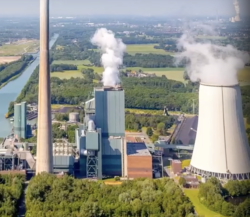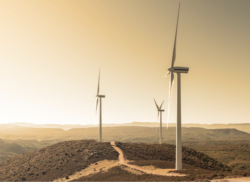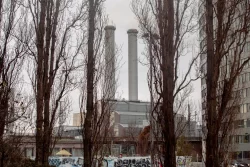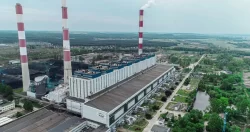Fossil Gas
Jul 2025, Scotland
Energy giant SSE may extend operations of Scotland’s dirtiest gas plant by ten years beyond its original timeline
SSE currently operates the largest and most polluting fossil gas plant in Peterhead, Scotland, which had plans to retire by 2030. Despite already starting construction on a new gas plant at the site, the company has now revealed it may extend the life of the…
Read MoreMay 2025, Ireland
Irish NGO challenges gas power plant developer in court
Friends of the Irish Environment (FIE) are taking developer An Bord Pleanála (ABP) to court, citing unlawful approval of a proposed 600 MW gas plant in Kerry. FIE argues that ABP failed to properly assess the project’s climate impact, using underestimated emissions figures that could…
Read MoreApr 2025, Romania
Romania’s fossil gas projects will be unprofitable by 2035
A new ENTSO-E study reveals that 2 GW of planned gas power plants in Romania are likely to be abandoned due to long-term economic unviability. As fossil gas becomes increasingly unprofitable, Romania must accelerate renewable energy deployment to maintain energy secuity.
Read MoreApr 2025, Germany
Germany’s new government nearly doubles fossil gas expansion plans
The newly formed CDU and SPD coalition has revised the Power Plant Safety Act to build 20 GW of new gas-fired power plant capacity by 2030. The gas plant will be incenstivised through capacity market subsidies.
Read MoreApr 2025, Germany
Local farmers oppose planned gas pipeline for the new Heil gas power plant
Farmers are protesting the proposed gas pipeline for the planned Heil gas power plant due to concerns that it would restrict their operations and damage the soil. The construction of the gas plant is currently dependent on the political framekwork of the new government.
Read MoreApr 2025, Germany
Climate activists protest EnBW’s planned gas power plant in Karlsruhe
Energy company EnBW is planning another fossil fuel plant at the Rhine harbor in Karlsruhe, where two coal and one gas units are operational. The Karlsruhe Climate Alliance is urging the local council not to rush this decision. They argue that the local community should…
Read MoreMar 2025, Italy
Study shows that converting Sardinia’s Fiume Santo coal plant to gas could result in a stranded asset
A new report by the Polytechnic University of Milan reveals that converting Sardinia’s Fiume Santo coal plant to gas would result in a stranded asset due to the availability of lower-cost electricity from solar and wind power. The report also shows that the plant would…
Read MoreJan 2025, Germany
Germany extends gas plant subsidies, undermining climate goals
Germany has extended a support scheme for certain gas plants by four years, pushing the deadline to 2030. The subsidies will last for 12 years, allowing the final applicants in 2030 to operate their plants beyond 2035—past the country’s target for fossil-free power.
Read MoreJan 2025, Spain
Greenpeace protests against Spanish gas plants like Totisa Holdings
Greenpeace docked their Arctic Sunrise icebreaker off the Canary islands to protest the development of more gas plants. Despite the island’s potential for renewable energy, it remains highly dependent on fossil fuels, risking the health and protection of both people and the environment.
Read MoreDec 2024, Albania
Albanian government “secretly” approves Roskovec gas power plant despite protests
The Albanian government has approved the construction of a 170 MW fossil gas plant in Roskovec, despite ongoing protests from residents and local farmers who have raised concerns about its environmental, health, and agricultural impacts.
Read MoreDec 2024, Ireland
Protest against new 600 MW gas plant in North Kerry, Ireland
Friends of the Earth Ireland is urging the Irish government to halt the proposed North Kerry gas plant, citing the energy company's financial troubles and lawsuits over misleading investors. In addition to the risk of becoming a stranded asset, the project would have serious consequences…
Read MoreNov 2024, UK
Fossil gas to make up less than 5% of the UK’s power consumption in 2030
The UK has set one of the most ambitious gas targets in Europe, aiming to reduce gas generation from 35% today to below 5% by 2030.
Read MoreOct 2024, Poland
Poland’s largest gas plant begins operations
The former coal plant, Dolna Odra, has begun operations as a gas plant (1434 MW).
Read MoreOct 2024, Italy
Generali to stop insuring risks linked to new gas plants
Italy’s largest insurer, Generali, is the first in the world to adopt a policy covering the entire oil and gas value chain for companies labeled as "transition laggards."
Read MoreOct 2024, UK
UK at risk of another energy crisis due to heavy reliance on gas
The Energy Crisis Commission found that British households and businesses were hit harder by the energy crisis than many other European countries because of high dependence on gas for heating and power generation.The Commission recommends developing a clear strategy to shift away from gas.
Read MoreOct 2024, Peterhead, UK
13,000+ people urge Scottish government to reject gas plant expansion plans in Peterhead
Over 13,000 people signed a petition by NGOs Friends of the Earth Scotland and 350.org, calling on the Scottish government to reject a proposed gas plant by energy companies SSE and Equinor. If approved, the plant would be operational by 2027 and run for decades.
Read More Plant ProfileAug 2024, Roydon, UK
Residents of UK village protest new gas plant plans
Residents of Roydon and nearby villages in the UK are campaigning against plans to build a new gas-powered electricity plant, citing concerns over the potential destruction of local ecology and wildlife.
Read MoreAug 2024, Romania
Romania to build “largest of its kind” gas plant in EU
Romania's Mintia gas-fired thermal power plant, slated to be the largest in the EU, is expected to come online in 2026. With its hefty €1.4 billion price tag, the plant will have a capacity of 1.7 GW.
Read MoreAug 2024, Italy
Italy’s capacity market auction for 2025 shows positive shift away from gas
In Italy's capacity market auction for 2025, minimal new gas capacity was awarded and only around 100 MW of gas repowering receiving payments. This is a positive shift compared to the previous year, where 35 GW of existing plants benefited from capacity payments.
Read MoreJul 2024, Belgium
Engie’s environmental permit application to expand Vilvroode gas plant is rejected
The Belgian government rejected Engie's environmental permit application to renovate and expand the Vilvroode gas plant from 250 MW to 875 MW. Now, the French utility is building one of the EU's largest battery parks on the site (200 MW).
Read MoreJun 2024, Nijmegen, NL
Nijmegen, NL residents oppose ENGIE’s fossil gas plant project
Local citizens of Nijmegen are protesting French utility ENGIE's new 500 MW fossil gas plant. Located on the site of its former coal plant, the gas plant’s projected 2045 lifespan contradicts Dutch climate goals.
Read More Plant ProfileApr 2024, Lombardy, IT
Unicredit and partners provide €320M in financing to EPH Group for new combined-cycle gas turbine
A pool of banks led by UniCredit is providing EUR 320M in project financing to EP Centrale Ostiglia S.p.A., part of EPH Group. The project includes the construction and operation of a new combined-cycle gas turbine unit (880MW) in Lombardy, Italy.
Read MoreFeb 2024, Germany
German government announces tenders for 12.5 GW of new gas plant capacity
Under its Power Plant Security Law, the German government plans to tender 12.5 GW of capacity of new “hydrogen-ready” gas power plants, which are expected to switch to hydrogen eight years after their commissioning date.
Read More






















